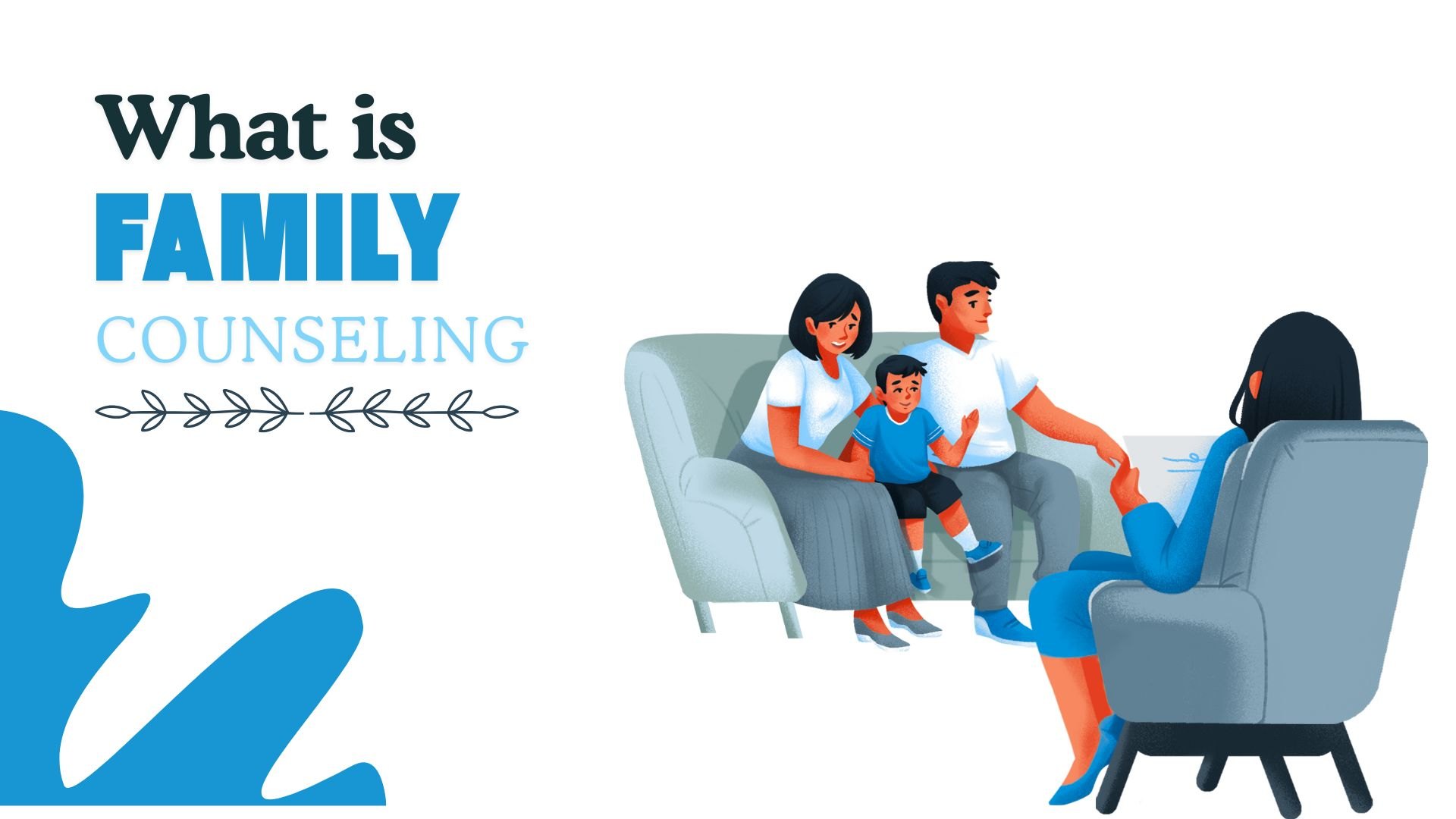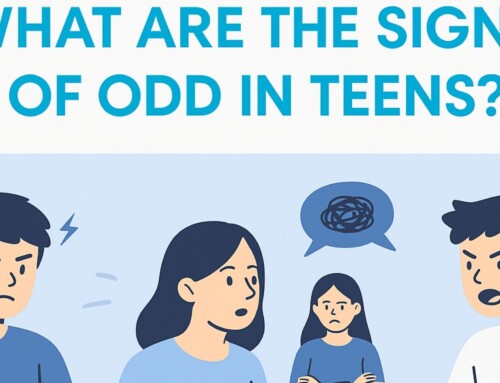What Is Family Counseling: Purpose and Impact
|
TL;DR
|
|---|
Families aren’t perfect. Conflicts happen, communication breaks down, and emotions run high. Family counseling helps bring clarity and connection back into the picture. It’s a structured way to address issues, improve relationships, and build healthier dynamics. In this blog, we will understand what is family counseling, what does a marriage and family counselor do, and what is the role of family counseling or therapy programs in today’s relationship world.
What is Family Counseling?
Family counseling, also known as family therapy, is a form of psychological support that focuses on improving communication and resolving conflicts within family units. Unlike individual therapy, which centers on one person, family counseling brings multiple family members together to address issues collectively. These family counseling sessions are guided by a trained therapist who helps identify patterns of behavior, miscommunication, and emotional struggles that affect the whole family.
The goal is not to place blame but to build understanding and cooperation. Whether the challenges stem from parenting conflicts, marital strain, or the stress of major life changes, family counseling offers tools and strategies to navigate them. It empowers families to rebuild trust, strengthen bonds, and develop healthier ways of relating to one another.
What is the Purpose of Family Counseling?
The primary purpose of family counseling is to help families function better as a unit, emotionally, behaviorally, and relationally. It promotes understanding, trust, and resilience, especially during challenging times. Apart from this, it serves the following purposes:
- Improving communication between family members
- Resolving long-standing conflicts and misunderstandings
- Coping with major transitions (divorce, relocation, mental illness, loss)
- Supporting children or teens with behavioral or emotional issues
- Strengthening overall family bonds and emotional well-being
How does Family Counseling Work?
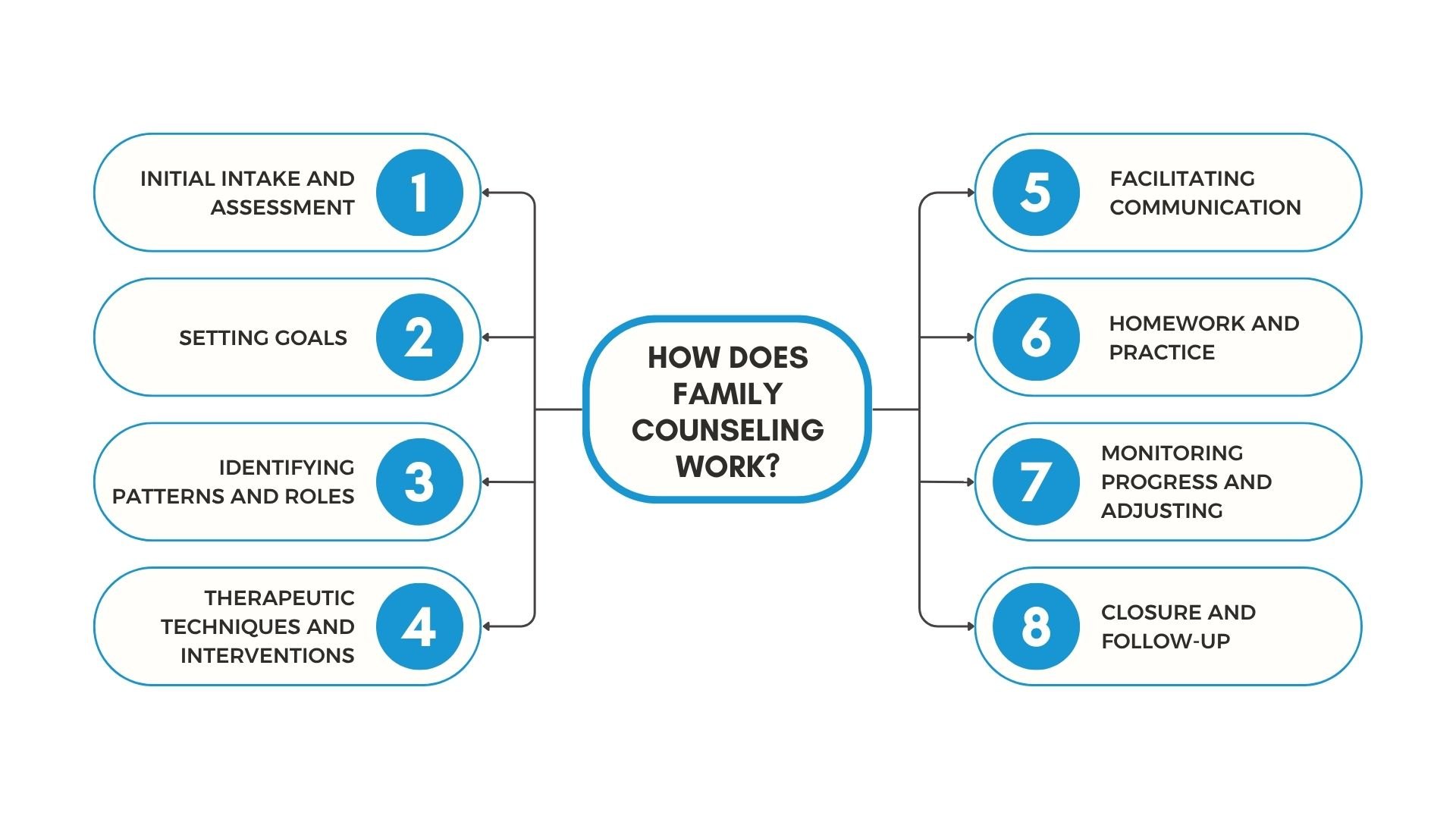
Family counseling or relationship counseling typically involves regular sessions where family members meet with a licensed therapist either in person or online. Here are the different steps involved in family counseling:
Step 1: Initial Intake and Assessment
The process begins with a therapist meeting the family (or key members) to gather background information. They assess family dynamics, identify emotional problems, and understand each member’s perspective.
Step 2: Setting Goals
Together with the therapist, the family sets specific, realistic goals like improving communication, resolving conflicts, or supporting a struggling member.
Step 3: Identifying Patterns and Roles
The therapist observes and highlights dysfunctional patterns, such as blame, avoidance, or poor listening. They help family members understand how their roles and behaviors affect one another.
Step 4: Therapeutic Techniques and Interventions
The therapist uses evidence-based techniques (e.g., role-playing, communication exercises, or cognitive restructuring) to shift unhealthy interactions toward healthier ones.
Step 5: Facilitating Communication
One of the core functions is teaching family members how to express feelings respectfully, listen actively, and respond constructively, reducing tension and misunderstandings.
Step 6: Homework and Practice
Families are often given tasks to practice between sessions, like trying new communication styles, setting boundaries, or resolving a conflict differently.
Step 7: Monitoring Progress and Adjusting
Therapists track the family’s progress over time and may adjust goals or techniques as needed. They help families reflect on what’s improving and where challenges remain.
Step 8: Closure and Follow-Up
Once goals are met, counseling tapers off. Some families may opt for periodic follow-ups to maintain progress and prevent relapse into old patterns.
What is Family Therapy? How does it differ from Family Counseling?
Family therapy is a type of psychological treatment aimed at helping family members improve communication, resolve conflicts, and address behavioral or emotional issues affecting the group. It is typically led by a licensed therapist trained in systems theory, which views the family as an interconnected unit, where changes in one person affect the entire group. Family therapy is often structured, goal-oriented, and may involve evidence-based approaches like cognitive-behavioral therapy (CBT) or solution-focused therapy.
While family counseling and family therapy are often used interchangeably, there are subtle differences. Family counseling is generally shorter-term and focuses on resolving specific issues or improving day-to-day communication and relationships. It’s often more guidance-based. Family therapy, on the other hand, tends to be more in-depth and clinical, often addressing underlying psychological patterns, mental health diagnoses, or chronic family dysfunction. So, if you are wondering how does family therapy work, it’s quite simple. Like family counseling, it also works by helping families identify and change unhealthy patterns to improve communication, resolve conflicts, and support emotional well-being.
In essence, family counseling is like coaching for better communication and harmony, while family therapy digs deeper into the emotional roots and psychological dynamics affecting the family system. Here is a summary of differences between the two:
| Aspect | Family Therapy | Family Counseling |
|---|---|---|
| Depth | More clinical and in-depth | More surface-level and guidance-based |
| Focus | Emotional patterns, mental health, chronic issues | Communication, relationship improvement, specific issues |
| Duration | Often longer-term | Typically short-term |
| Approach | Uses evidence-based methods (e.g., CBT, systems theory) | Supportive and practical advice |
| Goal | Heal deeper dysfunction | Improve day-to-day interactions |
What are the Different Types of Family Therapy?
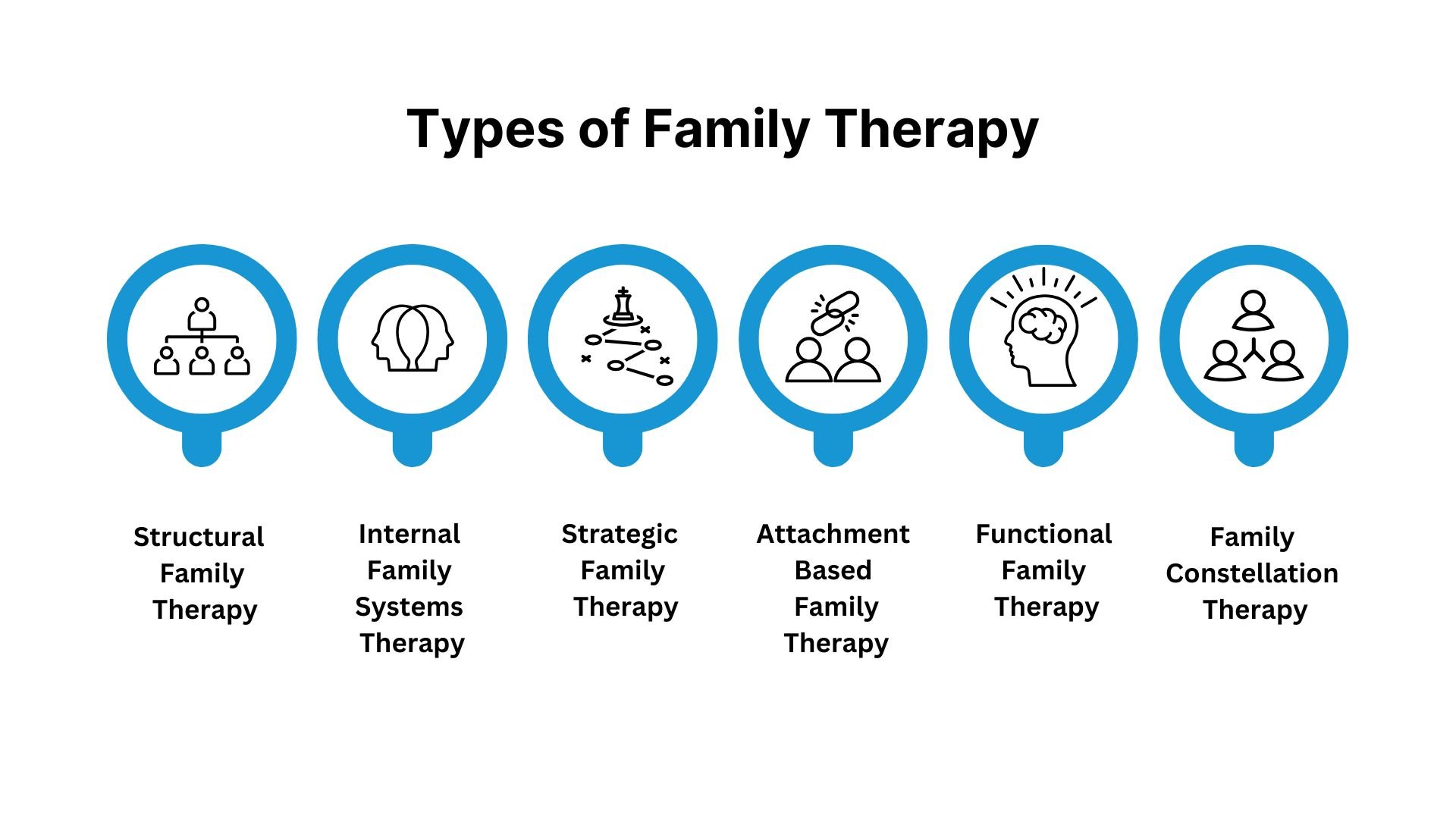
Family therapy encompasses various approaches, each with its own techniques and theoretical foundations. These models aim to improve family functioning by addressing communication breakdowns, emotional issues, and relational patterns. Here are the different types of therapy:
1. What is Structural Family Therapy?
Structural family therapy, or structural therapy, developed by Salvador Minuchin, focuses on the organization and hierarchy within a family system. It identifies unhealthy family structures, like blurred boundaries or power imbalances, and helps reorganize them to promote healthier interactions and roles. The therapist often observes family sessions to understand patterns and guide structural changes.
2. What is Internal Family Systems Therapy?
Internal Family Systems (IFS), created by Richard C. Schwartz, is a type of therapy that views each person as made up of multiple “parts” or sub-personalities. It explores how these internal parts interact and how they influence relationships within the family. In family settings, IFS helps individuals understand and heal their inner conflicts, leading to more compassionate and constructive family dynamics.
3. What is Strategic Family Therapy?
Strategic family therapy is a brief, directive form of therapy that focuses on solving specific problems. The therapist designs strategies and tasks to disrupt dysfunctional behavior patterns and encourage positive change. It often involves assigning homework and deliberately provoking situations that reveal hidden dynamics and foster resolution.
4. What is Attachment Based Family Therapy?
Attachment-Based Family Therapy (ABFT) is rooted in attachment theory and is particularly effective for adolescents dealing with depression, trauma, or suicide risk. For instance, a trauma therapy session focuses on repairing emotional bonds due to past traumas and restoring trust between parents and children. Therapists help family members communicate feelings of hurt or fear and rebuild secure attachments.
5. What is Functional Family Therapy?
Functional Family Therapy (FFT) is evidence-based and often used with at-risk youth and families experiencing behavioral issues. It combines clinical theory with behavior change techniques to address risk factors and promote protective ones. The therapy unfolds in stages, including engagement, motivation, behavior change, and generalization.
6. What is Family Constellation Therapy?
Family Constellation Therapy is an alternative approach developed by Bert Hellinger. It examines how unresolved traumas or hidden dynamics from previous generations affect the current family. Using role-play or group representatives, this therapy seeks to reveal and resolve systemic entanglements to bring clarity and healing across generations.
What are the Common Issues Addressed in Family Counseling?
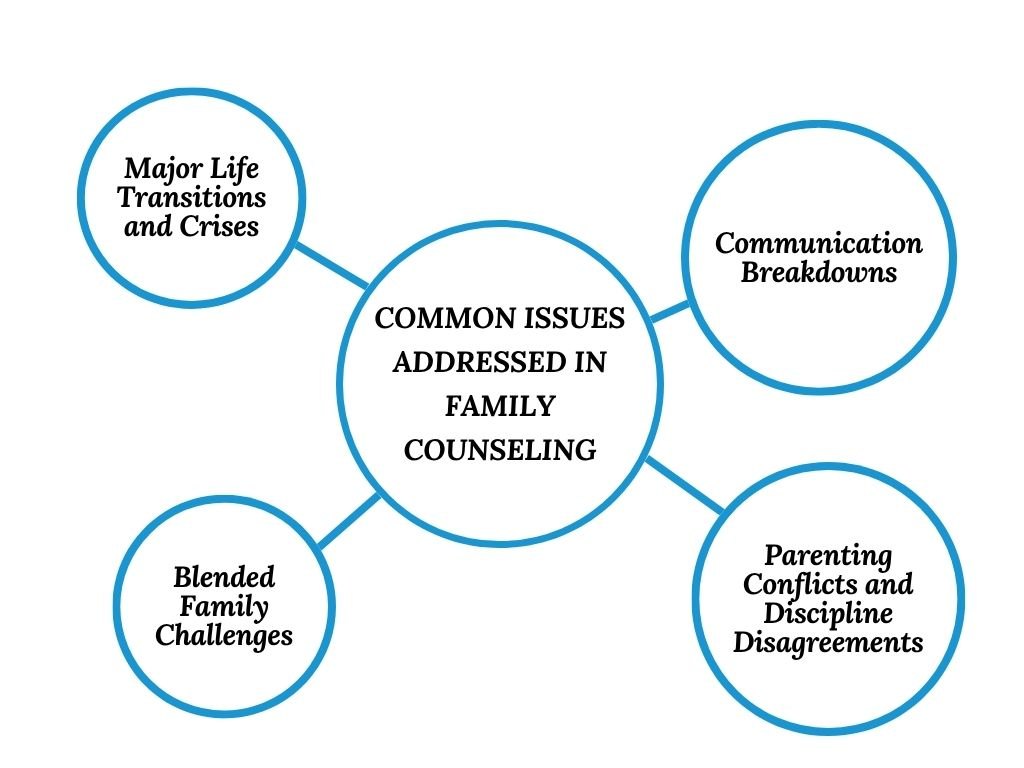
Family counseling helps with many problems in the family unit. These can be behavioral problems, mental health issues, or troubles with emotional health. Here are the main ones –
1. How Family Counseling Addresses Communication Breakdowns?
Poor communication is one of the most common family issues addressed in family counseling. This includes frequent misunderstandings, avoidance of difficult conversations, or aggressive exchanges. Counselors help family members learn how to express themselves clearly and listen actively, creating a more respectful and open family environment.
2. How Family Counseling Addresses Parenting Conflicts and Discipline Disagreements?
Families often seek counseling when parents struggle to agree on how to raise or discipline their children. These disagreements can create anxiety for children and tension between parents. A therapist helps align parenting styles and set consistent boundaries through anxiety therapy that support healthy child development.
3. How Family Counseling Addresses Blended Family Challenges?
Stepfamilies and blended families can face unique challenges such as loyalty conflicts, resentment, or role confusion. Family counseling provides a space to navigate these transitions, establish trust, and build new family relationships between step-parents, step-siblings, and biological family members.
4. How Family Counseling Addresses Major Life Transitions and Crises?
Significant changes such as divorce, the loss of a loved one, relocation, or financial hardship can destabilize a family. Counseling helps families adjust to these changes, process emotions together, and develop strategies to move forward as a stronger unit.
At Total Life Counseling, we understand what you’re going through because we’ve supported countless families facing similar challenges. People who feel stuck, misunderstood, or overwhelmed by the weight of their challenges can benefit from our TLC Therapy in Tampa. Whether it’s a troubled marriage or family chaos, we’re here to help.
How to Find a Good Family Counselor?
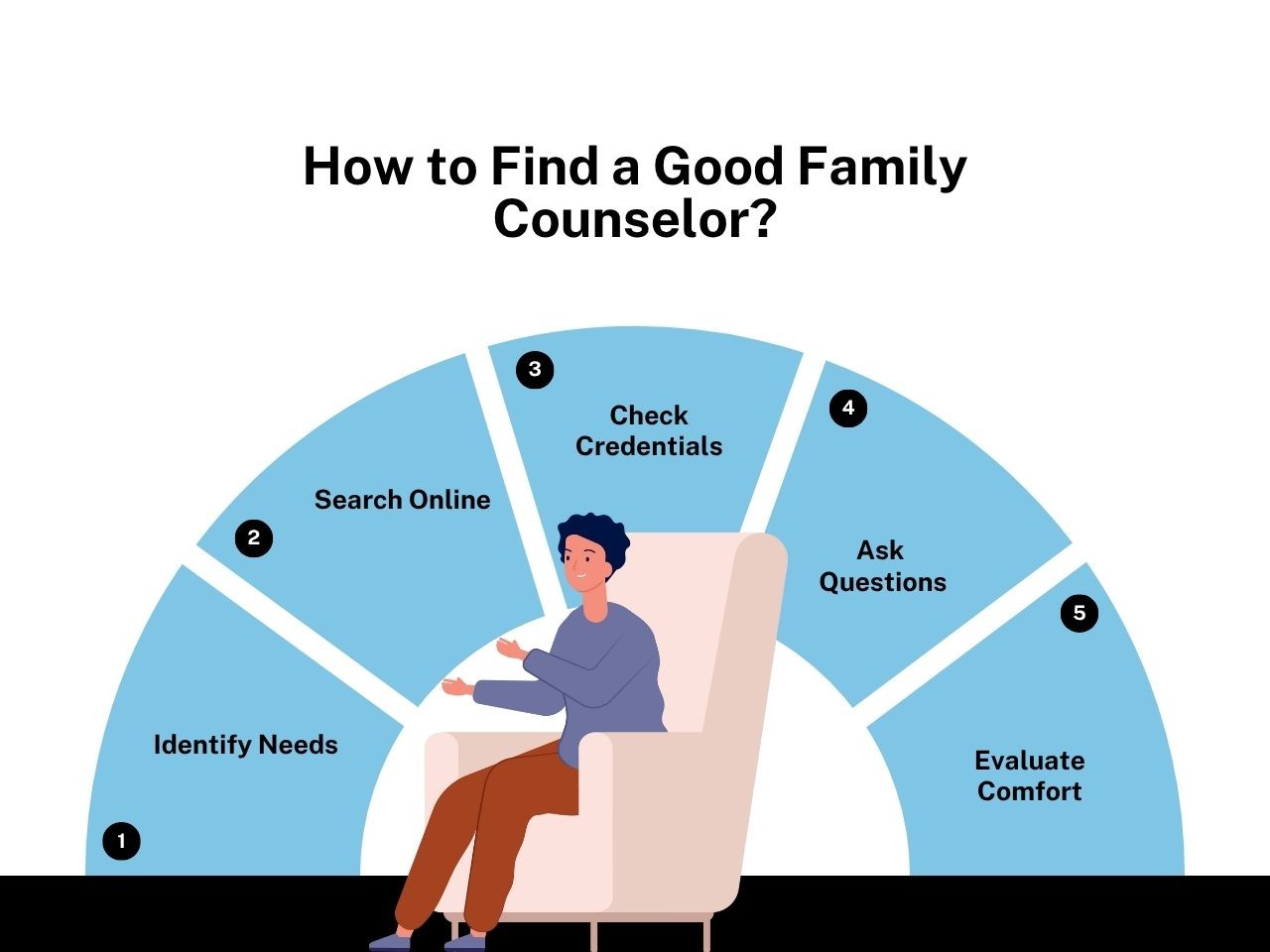
The best family counseling is all about choosing the right therapist who understands your family’s unique dynamics. Here’s how to identify a counselor who’s qualified, experienced, and a great fit.
Step 1 (Identify Needs): How to Identify Specific Family Needs?
Start by clearly understanding why you’re seeking family counseling. Are you dealing with communication issues, parenting disagreements, addiction, grief, or a major transition like divorce? Identifying your goals helps narrow down counselors who specialize in those specific challenges.
Step 2 (Search Online): How to Use Referrals or Online Search to Find a Counselor?
Ask your primary care doctor, pediatrician, school counselor, or trusted friends for recommendations. You can also use online directories like. Look for therapists who mention family systems or family counseling as a core service.
Step 3 (Check Credentials): How to Evaluate Credentials and Experience?
Before reaching out, make sure the therapist is licensed and trained to work with families. Here are the key qualifications to look for:
- Licensed Marriage and Family Therapist (LMFT), Licensed Clinical Social Worker (LCSW), or equivalent
- A degree in psychology, counseling, or social work (Master’s degree or Doctorate level). A bachelor’s degree will also work if they are well-experienced.
- Specialized training in approaches like Bowen, Structural, or Strategic Family Therapy
- Experience with diverse family dynamics and issues relevant to your case
- Positive reviews or testimonials (if available)
Step 4 (Ask Questions): What are the Right Questions During the First Session?
Whether it’s a phone call, email, or initial session, asking the right questions helps you assess whether they’re a good fit. Here are some potential questions to ask:
- What’s your experience dealing with the specific issue we’re facing?
- How do you involve individual family members in sessions?
- What therapy models do you use in family counseling?
- How do you handle conflict or resistance during a session?
- Do you offer online counseling if needed?
Step 5 (Evaluate Comfort): How to Identify Fit After the First Session?
After your first session, reflect on the experience as a family. Find out the answer to the following questions:
- Did everyone feel heard and respected?
- Was the therapist neutral and professional?
- Did the therapist create a comfortable, non-judgmental space?
If something feels off, it’s okay to try someone else. Fit matters a lot in family therapy.
Support That Brings Families Closer: At Total Life Counseling
At Total Life Counseling, we believe that every family deserves a space to feel heard, understood, and supported. Our approach to family therapy at Tampa goes beyond surface-level conversations. We focus on helping families rebuild connection, resolve long-standing tension, and create practical pathways to healthier dynamics at home.
Gemima McMahon, M.A., LMHC, our trauma counselor, offers this care with both warmth and structure. With advanced training in Accelerated Resolution Therapy (ART) and Gottman Level I, Gemima works closely with children, teens, women, and couples to address issues such as trauma, relationship conflict, low self-esteem, and emotional disconnection.
Whether your family is going through a tough season or simply wants to strengthen its foundation, Gemima and the Total Life Counseling team are here to guide you with compassion and clarity, one step at a time. Schedule a free 15-minute consultation to see how we can help your family reconnect and grow stronger together.
Conclusion
Family counseling isn’t just for families in crisis. It’s a proactive, supportive approach to maintaining emotional health, resolving hidden tensions, and improving the way family members relate to one another. Whether you’re dealing with persistent conflict, navigating a major life change, or simply feeling disconnected, family therapy offers a path forward. By creating a safe, structured environment to address issues collectively, family counseling helps families grow together rather than apart. With the right guidance, even the most complicated dynamics can be transformed into stronger bonds, deeper understanding, and a healthier home life.
Frequently Asked Questions
Does family counseling work?
Yes, family counseling can be highly effective. It helps families improve communication, resolve conflict, and build stronger, healthier relationships through guided, structured sessions with a trained therapist. So, if you are still wondering – do we need family therapy, or is it right for us? The answer is yes.
What is marriage and family therapy?
Marriage and Family Therapy (MFT) is a type of counseling that addresses the emotional and relationship challenges between couples and family members. It focuses on improving interaction patterns and resolving issues collectively.
What is triangulation in family therapy?
Triangulation occurs when one family member pulls a third person into a conflict to relieve tension or gain support. It often disrupts healthy communication and is addressed in therapy to restore direct, balanced relationships.
How much is family counseling?
Family counseling costs vary greatly, depending on the therapist’s credentials, location, and session length. Contact us for family counseling fees in our Tampa office.
What is family planning counseling?
Family planning counseling provides information and support around reproductive health, birth control options, pregnancy decisions, and family size planning. It’s often offered in healthcare or public health settings.
What is marriage and family counseling?
Marriage and Family Counseling is a form of therapy that helps couples and families work through relational issues, emotional challenges, or life transitions, focusing on healing and growing together.
Filed in: Family, family counseling
Share This Story, Choose Your Platform!
Total Life Counseling Center consists of Licensed Counselors, masters level therapists, Español counselors, Licensed Mental Health Counselors, business coaches, and image enhancement coaches who provide counseling for emotional, mental, physical and spiritual care including marriage, individual, family, substance abuse and more. TLC’s family, trauma and marriage experts have been interviewed on National and Local TV/Radio over 200 times for their expert advice on Fox News, OWN, WETV, ABC’s Medical Minute and more. Our skilled counselors are relational, approachable and specialists providing therapy services in the Central Florida area including: Orlando, Winter Park, MetroWest, Windermere, Dr. Phillips, East Orlando, Lake Mary, and Clermont, Boca Raton Florida, and Dallas, TX.

